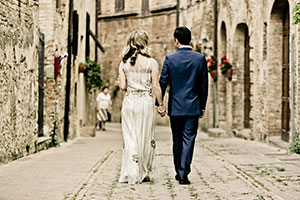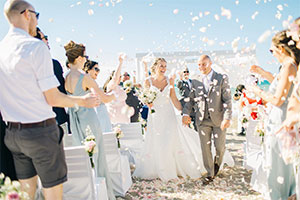Launched in July 2019 and the first to market in the UK, Luvana.co.uk is a free-to-use online portal dedicated exclusively to couples planning an overseas wedding in Europe. Set to revolutionise the ever-expanding destination wedding market, Luvana is the first of its kind in the UK to showcase suppliers abroad in addition to those able to operate within the key European destinations. Bringing together a carefully curated directory of more than 2,000 respected brands at launch, alongside an array of functional tools and useful checklists, Luvana is destined to become the essential planning resource for couples marrying abroad.
We talk to Lisa Burton, Luvana’s founder with 15 years’ planning experience and more than 1,400 destination weddings under her belt, to get her expert advice on planning a dream destination wedding.
1 | Beware of the budget
There are many reasons why couples choose to get married abroad but generally a wedding abroad is a lot more cost effective than a wedding at home, typically because destination weddings are generally smaller. Be mindful though that not every country will be a budget destination. To keep within your budget, go local wherever you can with suppliers.
2 | Gauge the guest list 
Destination weddings are a great way to cut down on the guest list. The average acceptance rate is lower than a stay at home wedding, as it’s a big commitment. If this is a concern, introduce the idea casually to your dearest family and friends to gauge their reaction before you commit to a wedding abroad.
3 | The temperature dictates the timings
Another big motivation for marrying overseas is the great weather. Remember though that it can be very hot and we often don’t realise how uncomfortable it can be stood in the midday sun dressed in a suit or wedding dress. For that reason, weddings abroad generally start later in the afternoon.
4 | Choose your venue wisely
It’s particularly important that your chosen destination suits the types of guests who will be invited. It’s likely your guests will see your wedding as an annual holiday so it needs to be an experience they’ll enjoy too!
5 | The travel arrangements
There’s no need to offer to pay for your guests’ accommodation and flights. The only exception to the rule is if you are marrying at a villa and accommodation is onsite and a necessary condition of the wedding venue hire. In this instance, many couples often ask for a small contribution from guests. It’s also good etiquette to pay for transfers to and from the venue on the wedding day.
6 | What to wear
Not only is it important to consider the heat but the dress also needs to be easily transported. Access to the venue itself is also a crucial consideration. Are you likely to encounter water or sand or a narrow, rickety bridge for example? And do respect local dress code rules especially if you are having a church wedding.
7 | Sourcing suppliers
Unless your budget extends to a pre-wedding visit you’re likely to do most of your research online with communication via email, phone or Skype. It’s important therefore to do your research and use your instinct when sourcing suppliers. Scour suppliers’ social media accounts for verified reviews, recent examples of work and testimonials. Ask for a brochure and a copy of the contract to be sent before you pay a deposit and request receipts for any deposits paid.
8 | Language barriers
Before you book a supplier be confident that the communication between you is good enough. Never sign a contract that is not in your own language or that you can’t understand. If the supplier doesn’t have a contract in English, it’s recommended to pay for an independent translation or look elsewhere rather than take any chances.
9 | Legalities 
First and foremost you’ll need to check you can legally marry in your destination; providing your wedding is legal in that country then it will be recognised in the UK. A quick search on Google will answer this for you and the government has a handy tool here https://www.gov.uk/marriage-abroad .
If a legal wedding is not possible, an alternative option is a blessing with a legal ceremony at home. Your guests needn’t know; a symbolic ceremony often looks exactly the same to the untrained eye.
Religious weddings are usually only legal if it falls under the state religion so be sure to check that out carefully. If in doubt, speak to your church before you consider destinations as they may offer advice on possible destinations.
Paperwork for civil weddings can take anything from two weeks to six months depending on the location, while religious weddings typically take six to eight months to complete all paperwork.
10 | Food
One of the lovely things about travelling abroad is the opportunity to experience the amazing local cuisine on offer and it can be a delight for guests to sample some traditional delicacies on the wedding day. There are however some considerations when it comes to food, with some destinations being more flexible than others.
Mediterranean style cuisine is quite easy on the palate and will usually please the pickiest of guests. When your food requirements are more serious such as vegan, gluten free or kosher, then it’s important to speak to your guests and your reception venue about this before booking the wedding as not every destination will offer all types of cuisine.
See luvana.co.uk for more advice on arranging your destination wedding.
Photos: Hannah Monika Photography; Daniele Ballini


Add new comment